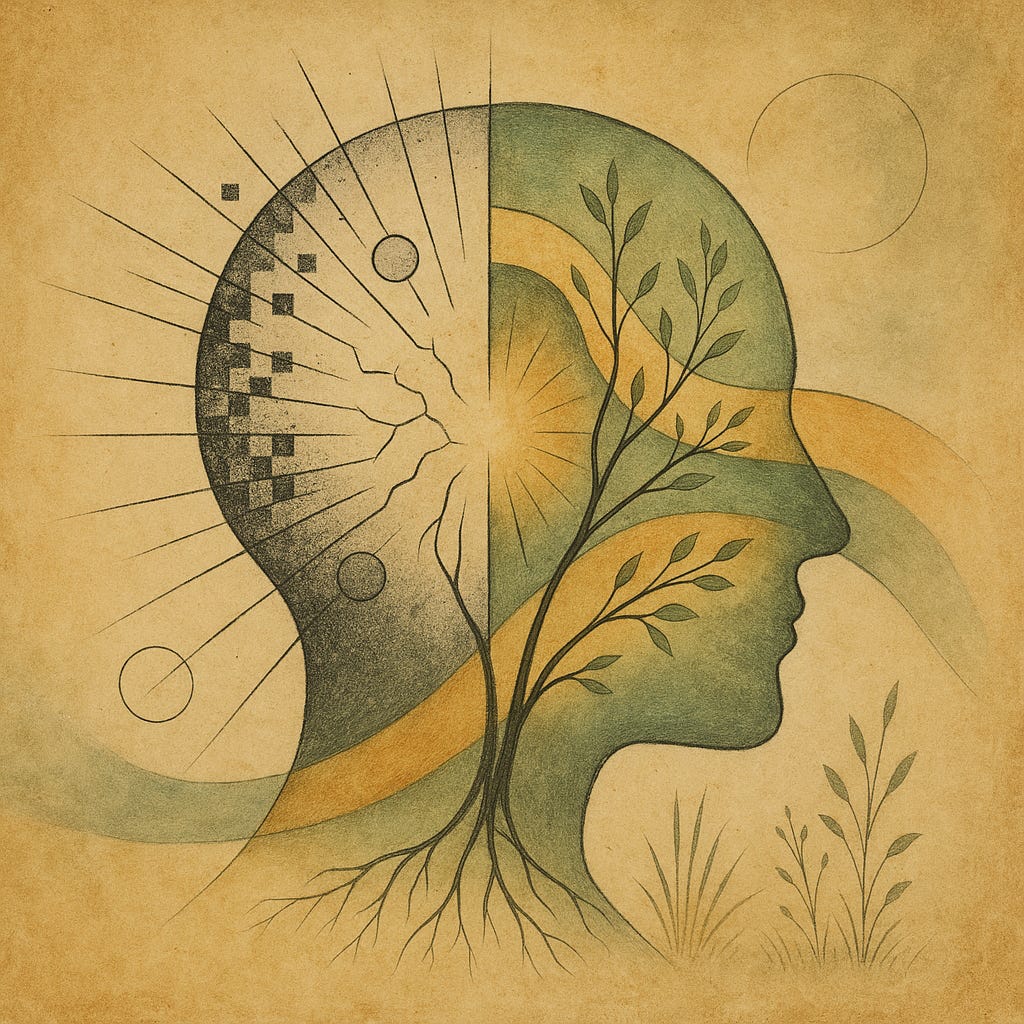A thousand times more Human
Let's get one thing straight: you and I aren't built for this mess we're currently living in. 300,000 years of human evolution—and we're somehow convinced that a mere 300 years of industrial madness defines us. We stumbled over fossil fuels, got drunk on the easy energy, and forgot how deeply ancient and wise we actually are. It's time to snap out of it.
The mind you are using right now—the one making sense of these words—isn't random or broken. It's an incredibly sophisticated survival machine, finely tuned by thousands of generations of ancestors living, foraging, loving, and surviving in a world wildly different from ours. And guess what? It worked. Brilliantly.
For hundreds of thousands of years, your ancestors weren't plugged into endless digital streams or chasing abstract numbers in bank accounts. They lived in real places, navigated real forests, tracked real food, and engaged deeply with real people. Their minds developed quick, intuitive shortcuts to handle life-and-death decisions, cooperate effectively, and avoid becoming lunch for something bigger. Those shortcuts—those powerful, intuitive heuristics—are still humming along inside you right now.
But these ancient mental shortcuts aren’t built for the constant digital chaos, fake social hierarchies, and relentless artificial stimulation that defines our daily lives. They evolved in small communities where you could trust faces you knew intimately, where your status mattered because it genuinely meant survival, and where resources weren't infinite dopamine loops but hard-earned meals shared around the fire. Now, we live in an environment flooded with calorie-packed junk, digital distractions, meaningless likes, and social media-induced anxiety. No wonder we're feeling messed up.
Your brain wasn't designed for TikTok, 24-hour news cycles, hyper-palatable processed foods, or endless email chains. Your ancient intuitive self—System 1, as cognitive scientists call it—is overwhelmed, confused, and stressed to the max. The once-useful "better safe than sorry" reactions now scream danger at every ambiguous social cue, while heuristics designed for limited resources trigger compulsive consumption of substances and screens.
Take a breath and shake,
because you're still fundamentally 1000 times more human than industrial. Those powerful, evolved heuristics haven't gone away; they're just buried under layers of modern noise. Deep within, you carry the legacy of ancestors who cooperated, trusted, cared, and thrived through countless real-world challenges. And critically, those evolved instincts can still guide you—but you need to actively create environments that align with them, instead of constantly fighting against them.
Think about this: traditional rituals, storytelling, and communities weren't mere cultural decorations—they were technologies. Technologies that leveraged our deep heuristics, calibrating social trust, cooperation, and ecological awareness into daily life. Rituals made trust intuitive. Stories encoded critical survival lessons. Community gave meaning and cohesion. And these cultural technologies can still help us—if we choose to reclaim and adapt them consciously.
Right now, you’re caught in a war between your ancient adaptive self and the toxic overload of modern distractions. It’s exhausting. But you can choose to build pockets of resistance. You can reintroduce genuine social connections, rituals that make sense, quiet spaces for focused attention, and natural environments where your intuition can flourish again. This isn't just self-care fluff—it's literally re-aligning your mind to its evolutionary sweet spot.
We’re never going back to the Pleistocene, nor should we. But we can recognize and respect the powerful cognitive legacy we carry. Your intuition isn't a glitch; it's a guide. Your instinctive desire for community, meaning, and purpose isn't naive; it's profoundly human.
The industrial era's three-century blip of distraction has been intense, but it's shallow compared to 300,000 years of deep evolutionary wisdom inside you. Trust your intuitive, evolved self again. Make choices that reflect human biology, not industrial madness. Because when you do, you'll finally start feeling—quite literally—1000 times more human.



Thank you for this post. It lifted my spirits. As an anthropologist and someone who sees these shortcuts, heuristics, metaphors and other ways of explaining and understanding the world, you mentioned, I often feel very lonely when I hear that with technology we can speed up, multi-task better and that people who have a "better" developed system first (implicitly people with ADHD , according to one of my students, - I teach neuroinstructional design) will cope and simply displace the less well-adjusted. And I feel deep down (and know from neuroscience) that this is a pipe dream and that loneliness, depression, confusion, overwhelm, etc., are just the side effects of not respecting our cognitive heritage.